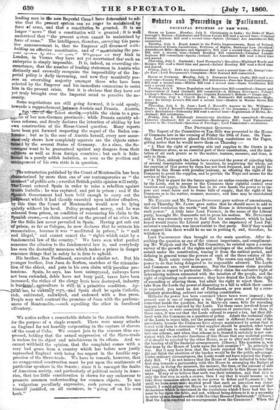The retraotation published by the Count of Montemolin has been
eharacterized by more than one of our contemporaries as "the meanest" of public acts ; a verdict British public opinion will ratify. The Count entered Spain in order to raise a rebellion against Queen Isabella ; he was captured, and put in prison ; and if the Spanish Government had been bold enough to carry out the
lignient which it had already executed upon inferior offenders, by this time the -Count of Montemolin would now be lying - 'quietly without his head. Policy prompted mercy, and he was released from prison, on condition of renouncing his claim to the Elpaniah crown,--a claim asserted on the ground of an alien law, 'for the Salk law never prevailed in Spain. Having got safe out of prison, is far as Cologne, he now declares that he retracts his renunciation, because it was "meditated in prison," is "null
• • and illegal," and cannot cancel the "rights which exist by a fundamental law of the country." We have seen what perfect nonsense the allusion to the fundamental law is, and everybody has seen the dastardly meanness which makes a prince in danger renounce things that in safety he is firm to uphold.
His brother, Don Ferdinand, executed a similar act. But his
younger brother, Don Juan de Borbon, snatches at the-irdianala- tion of the eldest, and puts in his own claim with-peculiar pre- tensions. Spain he says, has been unimF-Sved, railways have not been extended, debts have not bew-paid, taxes have been increased, the riches of the clergy have been destroyed, industry
is bur 3_, -:..culture is irtillAica primitive condition. Ap- e he v says -dud Spain shall be again Catholic, - rich, cultivated, railwayed, and endowed with a free press.
People may well contrast the promises of Juan with the perform- ances of Montemolin,—each equalling the other in barefaced effrontery. --


























 Previous page
Previous page